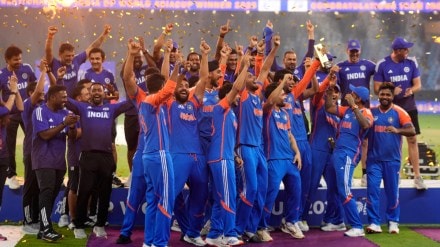If the BCCI did not withdraw from the Asia Cup, it was not for monetary considerations, as is implied, but because the government feared it would jeopardise the country’s hopes of hosting the 2036 Olympics. With cricket becoming an Olympic sport from 2028, Pakistan could have attempted to sabotage our chances, claiming that India had violated the Olympic charter by boycotting a multilateral tournament involving an Olympic sport.
Some Indian columnists, raised in the Oxbridge, British public school traditions, object agitatedly to Indian captain Suryakumar Yadav’s refusal to shake hands with the Pakistani captain, forgetting that the once elite sport rules have altered dramatically since the Marylebone Cricket Club framed governance laws in 1788. Avoiding shaking hands is not unknown in the sports world. For example, Ukrainian tennis players don’t shake hands with Russian and Belarus opponents and no one objects. Not shaking hands cannot be equated with Pakistan’s subsequent petulant and uncivilised tantrums.
However, what is regrettable is the growing interference of governments in sports bodies. Amit Shah’s son Jay, now chairperson of the ICC, clearly still wields clout in the BCCI. Pakistan is more brazen. The Pakistan cricket board chief Mohsin Naqvi is also the country’s interior minister and head of the Asian Cricket Council! Incidentally, Jay Shah and his former BCCI colleagues were conspicuously absent at the Dubai matches, presumably because they wanted to avoid any chance of TV cameras focusing on them sitting in proximity with their Pakistani counterparts.
Possession is Law
The murder last month of an 85-year old British woman at 7, Jantar Mantar, has focused attention after decades on the curious, convoluted history of the sprawling property. While the woman lived in a separate enclosure called the White House, in the rest of the two-and-a-half-acre compound stands a dilapidated stately mansion with an over 50-year-old disputed ownership that reflects the divisive nature of our political parties. 7, Jantar Mantar, in the heart of Lutyens New Delhi, would be worth hundreds of crores if ever sold as real estate.
The main building, with majestic pillars and marble flooring, was once owned by a wealthy nawab who left for Pakistan during Partition. The Congress under Jawaharlal Nehru took over the premises, but its presence is now only manifest in the sepia photographs of pre-Independence Congress leaders in the library. Today JD(U) election posters for the Bihar campaign with mugshots of Nitish Kumar are far more conspicuous, since the JD(U) occupies a large section of the first floor. There are other name plates as well, indicating offices of an insurance company, a pest control service and financial traders, all of whom pay rent. There is also a journalist association which split into two at some point, a tenant recalls.
After Indira Gandhi was thrown out of the Congress in 1969 for defying the party whip, the party split with the Congress (O) faction taking physical possession of the building while the matter dragged on in the courts. In 1977, Indira lost the elections and the Congress (O), which had by then merged into the Janata Party, claimed ownership. But the new Prime Minister Morarji Desai shrewdly donated the building not to his new party, but set up a separate trust, the Sardar Vallabhbhai Smarak Trust, with himself as President.
The Janata Party moved to the first floor, though it was made clear that they were tenants, not owners. The Janata Party split gradually into several factions, as Desai had perhaps apprehended. Eventually, the Janata Dal (U) appropriated much of the space. For years, the JD(U) occupied the premises gratis but has recently agreed to pay a monthly rent of Rs 2,000 to the trust now headed by Dinshah Patel. Over the years, several party office workers with loyalties to different factions have grabbed outhouses at the back and converted them into rent-free residences adorned with potted plants. The story goes that even the late Swami Agnivesh, who championed the cause of freeing bonded labour, arrived as a guest for a few days and refused to leave. After all, at 7, Jantar Mantar, possession is not nine-tenths of the law, but 100 per cent.
Regime Stamp
The proclivity of parties to name institutions only after its heroes extends to issuing postal stamps. Last week, PM Modi released a stamp marking the centenary of the RSS, once banned by an earlier regime. Interestingly, the Post Office’s 10-year series of the Makers of Modern India, which was released during Manmohan Singh’s tenure, was abruptly replaced ahead of schedule after the Modi government came to power. The 10 personalities of the UPA series included three from the Nehru-Gandhi family alone. The new series brought out in 2016 includes Deen Dayal Upadhyaya, Rajendra Prasad, Abdul Kalam, Jayaprakash Narayan and Lal Bahadur Shastri.
